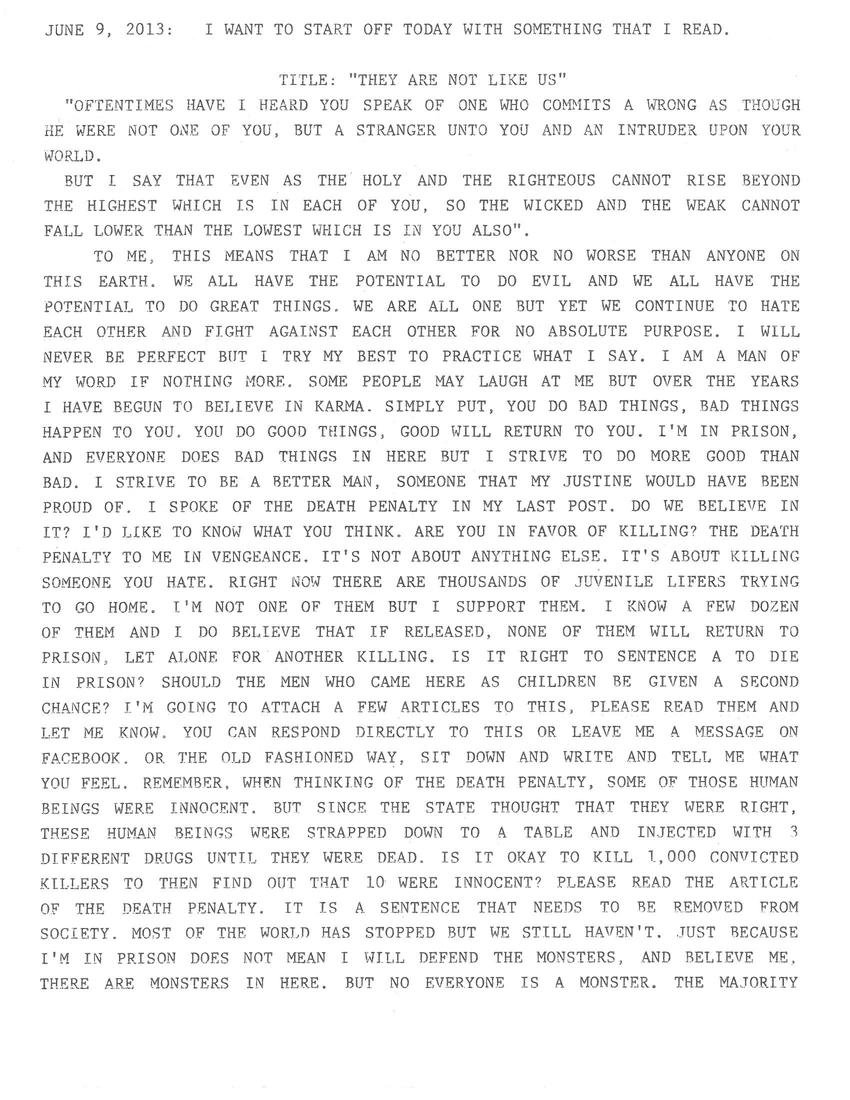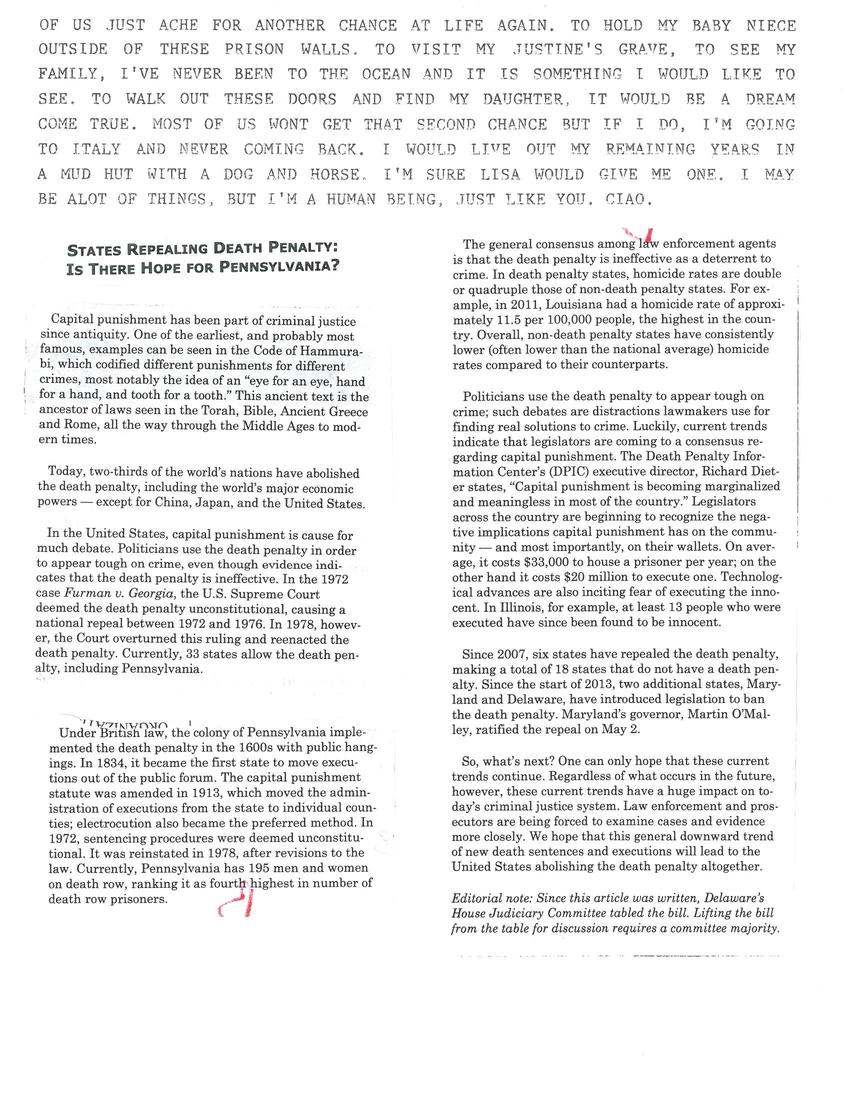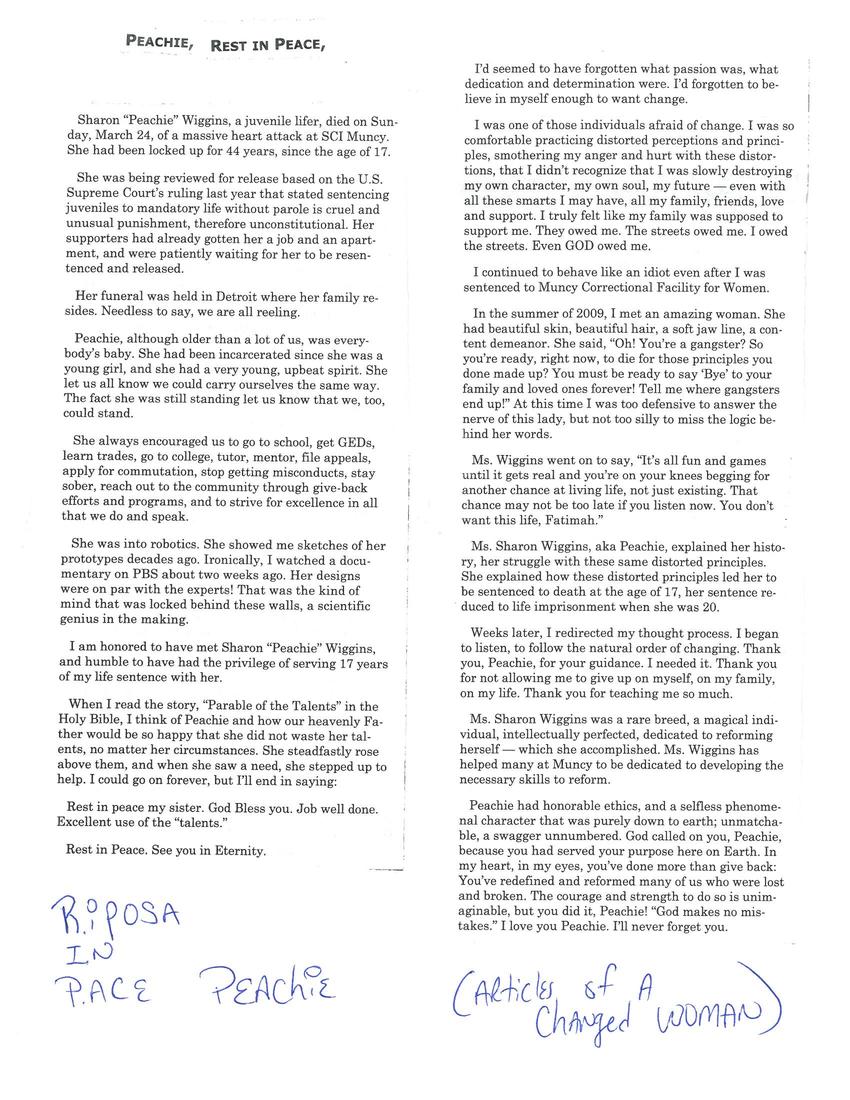
Transcription
June 9, 2013: I want to start off today with something that I read.
Title: "They are not Like Us"
"Oftentimes have I heard you speak of one who commits a wrong as though he were not one of you, but a stranger unto you and an intruder upon your world.
But I say that even as the holy and the righteous cannot rise beyond the highest which is in each of you, so the wicked and the weak cannot fall lower than the lowest is in you also."
To me, this means that I am no better nor no worse than anyone on this earth. We all have the potential to do evil and we all have the potential to do great things. We are all one but yet we continue to hate each other and fight against each other for no absolute purpose. I will never be perfect but I try my best to practice what I say. I am a man of my word if nothing more. Some people may laugh at me but over the years I have begun to believe in karma. Simply put, you do bad things, bad things happen to you. You do good things, good will return to you. I'm in prison and everyone does bad things in here but I strive to do more good than bad. I strive to be a better man, someone that my Justine would have been proud of. I spoke of the death penalty in my last post. Do we believe in it? I'd like to know what you think. Are you in favour of killing? The death penalty to me in vengeance. It's not about anything else. It's about killing someone you hate. Right now there are thousands of juvenile lifers trying to go home. I'm not one of them but I support them. I know a few dozen of them and I do believe that if released, none of them will return to prison, let alone for another killing. Is it right to sentence A to die in prison? Should the men who came here as children be given a second chance. I'm going to attach a few articles to this, please read them and let me know. You can respond directly to this or leave me a message on Facebook. Or the old fashioned way, sit down and write and tell me what you feel. Remember, when thinking of the death penalty, some of those human being were innocent. But since the State thought that they were right, these human beings were strapped down to a table and injected with three different drugs until they were dead. Is it okay to kill 1,000 convicted killers to then find out that 10 were innocent? Please read the article of the death penalty. It is a sentence that needs to be removed from society. Most of the world has stopped but we still haven't. Just because I'm in prison does not mean I will defend the monsters, and believe me, there are monsters in here. But not everyone is a monster. The majority of us just ache for another chance at life again. To hold my baby niece outside of these prison walls. To visit my Justine's grave, to see my family, I've never been to the ocean and it is something I would like to see. To walk out these doors and find my daughter, it would be a dream come true. Most of us don't get that second chance but if I do, I'm going to Italy and never coming back. I would live out my remaining years in a mud hut with a dog and a horse. I'm sure Lisa would give me one. I may be a lot of things, but I'm a human being, just like you. Ciao
States Repealing Death Penalty: Is there Hope for Pennsylvania
Capital punishment has been part of criminal justice since antiquity. One of the earliest, and probably most famous, examples can be seen in the Cod of Hammurabi, which codified different punishments for different crimes, most notably the idea of an "eye for an eye, hand for a hand, and tooth for a tooth." This ancient text is the ancester of laws seen in the Torah, Bible, Ancient Greece and Rome, all the way through the Middle Ages to modern times.
Today, two-thirds of the world's nations have abolished the death penalty, including the world's major economic powers - except for China, Japan, and the United States.
In the United States, capital punishment is a cause for much debate. Politicians use the death penalty in order to appear tough on crime, even though evidence indicates that the death penalty is ineffective. In the 1972 case Furnman v. Georgia, the U.S. Supreme Court deems the death penalty unconstitutional, causing a national repeal between 1972 and 1976. In 1978, however, the Court overturned this ruling and re-enacted the death penalty. Currently, 33 states allow the death penalty, including Pennsylvania.
Under British law, the colony of Pennsylvania implemented the death penalty in the 1600s with public hangings. In 1834, it became the first state to move executions out of the public forum. The capital punishment statute was amended in 1913, which moved the administration of executions from the state to individual countries; electrocution also became the preferred method. In 1972, sentencing procedures were deemed unconstitutional. It was reinstated in 1978, after revisions to the law. Currently, Pennsylvania has 195 men and women on death row, ranking it as fourth highest in number of death row prisoners.
The general consensus among law enforcement agents is that the death penalty is ineffective as a deterrent to crime. In death penalty states, homicide rates are double or quadruple those of non-death penalty states. For example, in 2011, Louisiana had a homicide rate of approximately 11.5 per 100,000 people, the highest in the country. Overall, non-death penalty states have consistently lower (often lower than the national average) homicide rates compared to their counterparts.
Politicians use the death penalty to appear tough on crime; such debates are distractions lawmakers use for finding real solutions to crime. Luckily, current trends indicate that legislators are coming to a consensus regarding capital punishment. The Death Penalty Information Center's (DPIC) executive director, Richard Dieter states, "Capital punishment is becoming marginalised and meaningless in most of the country." Legislators across the country are beginning to recognise the negative implications capital punishment has on the community - and most importantly, on their wallets. On average, it costs $33,000 to house a prisoner per year, on the other hand it costs $20 million to execute one. Technological advances are also inciting fear of executing the innocent. In Illinois, for example, at least 13 people who were executed have since been found to be innocent.
Since 2007, six states have repealed the death penalty, making a total of 18 states that do not have a death penalty. Since the start of 2013, two additional states, Maryland and Delaware, have introduced legislation to ban the death penalty. Maryland's governor, Martin O'Malley, ratified the repeal on May 2.
So what's next? One can only hope that these current trends continue. Regardless of what occurs in the future however, these current trends have a huge impact on today's criminal justice system. Law enforcement and prosecutors are being forced to examine cases and evidence more closely. We hope that this general downward trend of new death sentences and executions will lead to the United States abolishing the death penalty altogether.
*Editorial note: Since this article was written, Delaware's House Judiciary Committee tabled the bill. Lifting the bill from the table for discussion requires a committee majority.
PEACHIE, REST IN PEACE,
Sharon "Peachie" Wiggins, a juvenile lifer, died on Sunday, March 24, of a massive heart attack at SCI Muncy. She had been locked up for 44 years, since the age of 17.
She was being reviewed for release based on the U.S. Supreme Court's ruling last year that stated sentencing juveniles to mandatory life without parole is cruel and unusual punishment, therefore unconstitutional. Her supporters had already gotten her a job and an apartment, and were patiently waiting for her to be re-sentenced and released.
Her funeral was held in Detroit where her family remedies. Needless to say, we are all reeling.
Peachie, altogether older than a lot of us, was everybody's baby. She had been incarcerated since she was a young girl, and she had a very young, upbeat spirit. She let us all know we could carry ourselves the same way. The fact she was still standing let us know that we, too, could stand.
She always encouraged us to go to school, get GEDs, learn trades, go to college, tutor, mentor, file appeals, apply for commutation, stop getting misconducts, stay sober, reach out to the community through give-back efforts and programs, and to strive for excellence in all that we do and speak.
She was into robotics. She showed me sketched of her prototypes decades ago. Ironically, I watched a documentary on PBS about two weeks ago. Her designs were on par with the experts! That was the kind of mind that was locked behind these walls, a scientific genius in the making.
I am honoured to have met Sharon "Peachie" Wiggins, and humble to have had the privilege of serving 17 years of my life sentence with her.
When I read the story, "Parable of the Talents" in the Holy Bible, I think of Peachie and how our heavenly father would be so happy that she did not waste her talents, no matter her circumstances. She steadfastly rose above them, and when she saw a need, she stepped up to help. I could go on forever, but I'll end in saying:
Rest in peace my sister. God Bless you. Job well done. Excellgent use of the "talents."
Rest in Peace. See you in Eternity.
I'dseemed to have forgotten what passion was, what dedication and determination were. I'd forgotten to believe in myself enough to want to change.
I was one of those individuals afraid of change. I was so comfortable practising distorted perceptions and principles, smothering my anger and hurt with these distortions, that I didn't recognise that I was slowly destroying my own character, my own soul, my future - even with all these smarts I may have, all my family, friends, love and support. I truly felt like my family was supposed to support me. They owed me. The streets owed me. I owed the streets. Even GOD owed me.
I continued to behave like an idiot even after I was sentenced to Muncy Correctional Facility for Women.
In the summer of 2009, I met an amazing woman. She had beautiful skin, beautiful hair, a soft jaw line, a content demeanor. She said, "Oh! You're a ganster? So you're ready, right now, to die for those principle you done made up? You must be ready to say 'Bye' to your family and loved ones forever! Tell me where gangsters end up!" At this time I was too defensive to answer the nerve of this lady, but not too silly to miss the logic behind her words.
Ms. Wiggins went on to say, "It's all fun and games until it gets real and you're on your knees begging for another chance at living life, not just existing. That chance may not be too late if you listen now. You don't want this life, Fatimah."
Ms. Sharon Wiggins, aka Peachie, explained her history, her struggle with these same distorted principles. She explained how these distorted principles led her to be sentenced to death at the age of 17, her sentence reduced to life imprisonment when she was 20.
Weeks later, I redirected my thought process. I began to listen, to follow the natural order of changing. Thank you, Peachie, for your guidance. I needed it. Thank you for not allowing me to give up on myself, on my family on my life. Thank you for teaching me so much.
Ms. Sharon Wiggins was a rare breed, a magical individual, intellectually perfected, dedicated to reforming herself - which she accomplished. Ms. Wiggins has helped many at Muncy to be dedicated to developing the necessary skills to reform.
Peachie had honourable ethics, and a selfless phenomenal character that was purely down to earth; unmatchable, a swagger unnumbered. God called on you, Peachie, because you had served your purpose here on Earth. In my heart, in my eyes, you've done more than give back: You've redefined and reformed many of us who were lost and broken. The courage and strength to do so is unimaginable, but you did it, Peachie! "God makes no mistakes." I love you Peachie. I'll never forget you.
Riposa in Pace Peachie (Articles of a Changed Woman).
Other posts by this author
|
2024 may 17

|
2024 may 14

|
2024 feb 27

|
2024 jan 23

|
2023 sep 2

|
2022 aug 4

|
More... |




Replies (4)
Bill